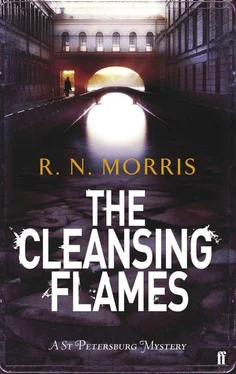R. Morris - The Cleansing Flames
Здесь есть возможность читать онлайн «R. Morris - The Cleansing Flames» весь текст электронной книги совершенно бесплатно (целиком полную версию без сокращений). В некоторых случаях можно слушать аудио, скачать через торрент в формате fb2 и присутствует краткое содержание. Год выпуска: 2011, ISBN: 2011, Издательство: Faber and Faber Fiction, Жанр: Исторический детектив, на английском языке. Описание произведения, (предисловие) а так же отзывы посетителей доступны на портале библиотеки ЛибКат.
- Название:The Cleansing Flames
- Автор:
- Издательство:Faber and Faber Fiction
- Жанр:
- Год:2011
- ISBN:0571259154
- Рейтинг книги:5 / 5. Голосов: 1
-
Избранное:Добавить в избранное
- Отзывы:
-
Ваша оценка:
- 100
- 1
- 2
- 3
- 4
- 5
The Cleansing Flames: краткое содержание, описание и аннотация
Предлагаем к чтению аннотацию, описание, краткое содержание или предисловие (зависит от того, что написал сам автор книги «The Cleansing Flames»). Если вы не нашли необходимую информацию о книге — напишите в комментариях, мы постараемся отыскать её.
The Cleansing Flames — читать онлайн бесплатно полную книгу (весь текст) целиком
Ниже представлен текст книги, разбитый по страницам. Система сохранения места последней прочитанной страницы, позволяет с удобством читать онлайн бесплатно книгу «The Cleansing Flames», без необходимости каждый раз заново искать на чём Вы остановились. Поставьте закладку, и сможете в любой момент перейти на страницу, на которой закончили чтение.
Интервал:
Закладка:
Virginsky stifled the cry of protest that was rising in his throat. The resultant sound resembled a sob of emotion. This seemed to decide the landlady. She pulled the door open to admit them.
Five white coffins of varying sizes were arranged on trestles. The grimy, smoke-blackened room was crowded with the dead, who seemed to be falling over one another in their prostrate immobility. The coffins were open. Virginsky could not avoid looking into them, could not avoid engaging with the faces of the dead children. The youngest of them must have been about eighteen months old, an infant. A girl, she was dressed like a doll, in her christening gown. Her face was unbearably perfect, with no evidence of burning or scars. Unblemished, adorable, dead. A red-painted egg lay on her chest, in her cupped hands.
It was too much for Virginsky, but everywhere he looked he saw the face of a dead child: two boys, one about five, the other seven or eight, in sailor suits; and two more girls, one about three, and the other whose age was hard to gauge: from her face, you would have said she was the eldest, but she was smaller in stature than the elder of the boys. All of them nestled their Easter eggs in limp, lifeless hands.
A thin, washed-out woman with a black shawl pulled up over her head sat in one corner. Her lips were constantly moving, though no words could be made out, just a hoarse, soft gurgling. Her eyes were wide and raw. She turned them on Virginsky with a look that had gone beyond emotion. It asked nothing of him, but was simply a reflex turning of the head. Her face, he saw, was swollen and streaked with moisture. It was not that her expression was dazed, rather that it was emptied — spent. She had felt all that it was humanly possible to feel. Now all she could do was turn her blank, uncomprehending gaze onto whatever came within her purview. She existed as a kind of warning, and nothing more.
‘You won’t get much sense out of her,’ said Yekaterina Ivanovna. ‘And he ’s out. At some tavern or other, I shouldn’t wonder.’
Porfiry nodded his understanding. All the same, he took a step towards the woman in the corner. At his approach, a kind of startled horror flitted over her face. It was as if she were horrified not at Porfiry, but at the idea that someone, anyone, would want to approach her. She recoiled, withdrawing herself, buffeted by a violent repulsive force that seemed to surround her. Her chair scraped back along the floor.
‘Madame Prokharchina,’ said Porfiry gently. ‘We have come to offer our condolences.’ He reached a hand out towards her. The woman jerked away from it.
‘This is not good,’ hissed Virginsky.
Her movements were sudden and stilted, like a captured bird. It seemed imperative to her to avoid human touch at any cost.
Porfiry continued his efforts to reassure her. ‘We are one with you in your grief.’
Virginsky felt a wave of anguish surge through him at Porfiry’s words, so perhaps what he had just said was true. But how could it be? How could anyone’s emotions at this moment compare with this woman’s? It was just a platitude, hypocritical and therefore abhorrent. Perhaps the anguish Virginsky felt was simply the hypersensitivity caused by an intolerable excess of embarrassment. After they — or rather Porfiry — had uttered their condolences, they would walk out of that apartment, away from the roomful of white coffins, closing the newly hung door behind them. The woman’s utterly worn-out face would fade from memory. In time, even the death-perfected faces of the children would be forgotten, or at least become harder and harder to recall.
Virginsky imagined the woman sitting in the corner of that room, the five coffins of her children in front of her, forever.
Suddenly he felt Porfiry’s gaze on him, as though he expected him to add a consoling sentiment. The woman too looked up at him expectantly. He looked back at them both in turn, aghast. But suddenly he felt compelled to say something. ‘I. . I cannot imagine. . cannot imagine. . how. . you bear this.’
The woman sighed. It seemed that she had somehow found relief, if not comfort, in Virginsky’s words; that to have a stranger speak the truth to her was all that she wanted.
Porfiry bowed and turned away from her. Virginsky continued to search her emptied eyes, as though now he was the one needing consolation from her.
‘It is a terrible tragedy,’ said Porfiry to the landlady.
The landlady seemed to crumple under his fluttering gaze. ‘I am to blame!’ she suddenly cried. ‘I promised I would sit with them. I promised I would look after them.’
‘Now, now. Don’t torment yourself, Yekaterina Ivanovna. You were not to know.’
‘I only stepped out for five minutes, to answer the call of nature. And on the way back, I paid a visit on the Widow Sudbina. She lives on the third floor. Her husband died not long ago and she has been melancholy ever since. They were sleeping soundly when I left, the little ones. What harm could come to them, I thought?’
‘It’s not your fault. You did not set the fire.’
‘You don’t understand.’ The landlady’s eyes stood out as if they were trying to distance themselves from what she was about to confess. ‘ I locked them in! For their own safety, you understand. You don’t know who is prowling around these buildings. That yardkeeper is worse than useless. He never asks to see anyone’s passport. He admits the most unsavoury characters. I locked them in! And then they wouldn’t let me go back upstairs because of the fire.’
It took a moment for Porfiry to absorb what the woman had told him. ‘No. You are not to blame. I repeat, you did not light the fire. You could not have known. My colleague and I are magistrates. Please rest assured that we will find the man responsible for this, and we will bring him to justice. Is that not so, Pavel Pavlovich?’
There was undeniably a challenge in Porfiry’s question. Virginsky said nothing. He bowed his head and in so doing once again found himself looking into the face of the youngest of the Prokharchin children. He thought of the embalmer’s hands on her tiny body, and wondered at the mysterious alchemy that had been worked to bring about her lifeless preservation. In truth, it was a brutal process, a cutting open, a ripping out, a filling in, a trussing up. A violation. The eyes could not turn to him in appeal, could not implore, held no rebuke, however gentle. He willed her grip to curl and tighten around the painted egg.
He felt certain that whoever had lit the fire, for whatever motives, had not wanted her dead. And yet the fire had been lit, and her death, however unintended, was the consequence.
Virginsky lifted his gaze from the child. But he found nowhere else in that room for it comfortably to settle.
Radonitsa
The solution came to Virginsky in the night while he was sleeping. He had not even started working on the problem, so it was indeed surprising that he had solved it so quickly. He woke from his dream with a start and sat bolt upright.
Lighting the tallow candle by his bedside, he pulled out the tin trunk that contained his collection.
Virginsky felt a strange sense of power, which was superseded almost immediately by one of revulsion. This was mysticism! He would not give in to it. He would not open the trunk. It was absurd to think he had dreamed the solution. He would leave the shamanism to Porfiry Petrovich.
He felt at once relieved to have made the decision. Opening that trunk would take him into a realm he had no wish to enter.
As soon as that realisation struck him, his relief evaporated. He stared in horror at the trunk. He imagined it containing some grisly secret: a severed body part, or the corpse of a child. The youngest of the Prokharchin children would just about fit inside it. No, it was inconceivable that he would open it. Not now, possibly not ever.
Читать дальшеИнтервал:
Закладка:
Похожие книги на «The Cleansing Flames»
Представляем Вашему вниманию похожие книги на «The Cleansing Flames» списком для выбора. Мы отобрали схожую по названию и смыслу литературу в надежде предоставить читателям больше вариантов отыскать новые, интересные, ещё непрочитанные произведения.
Обсуждение, отзывы о книге «The Cleansing Flames» и просто собственные мнения читателей. Оставьте ваши комментарии, напишите, что Вы думаете о произведении, его смысле или главных героях. Укажите что конкретно понравилось, а что нет, и почему Вы так считаете.












